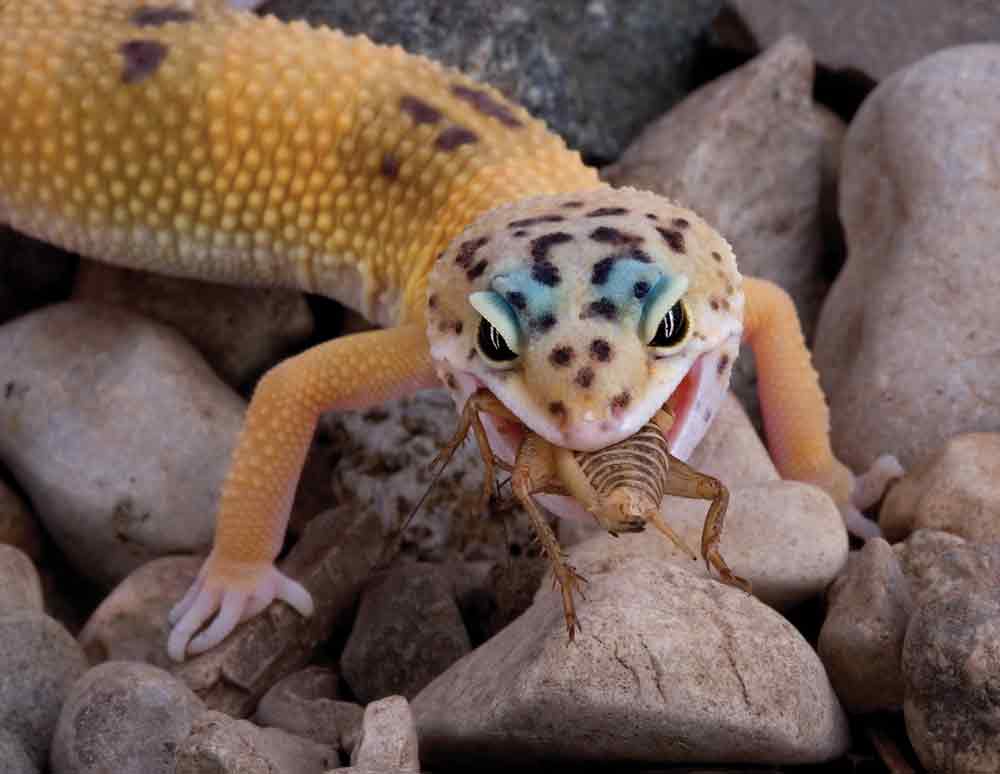There is a difference between feeding the insects for your reptile’s nutrition and feeding the insects for their nutrition.
“You are what you eat” is a common saying I tell my clients when discussing gut loading. However, gut loading is often a misused term and taught incorrectly, as nutritional diseases remain prevalent in our captive reptiles. In this article I’ll discuss how to properly gut load your insects to provide the best nutrition for your reptile.
Before we discuss gut loading, we need to look at the nutritional content of insects, and the shipping process they go through. Most of the available feeder insects are deficient in calcium and vitamin A and high in phosphorus, which predisposes animals to diseases such as nutritional secondary hyoerparathyroidism, aka metabolic bone disease, and hypovitaminosis A. There are some exceptions- black soldier fly larvae are higher in calcium than most commonly kept feeders. Additionally, through the way many, but not all, insects are transported, they arrive at their destinations dehydrated with nothing in their system.
Exotic Insect Feeders For Your Herps
Metabolic Bone Disease In Reptiles
Thus, if you feed your reptile insects directly from picking them up, you are feeding severely dehydrated and deficient prey. It is also important to note that gut loading needs to coincide with dusting of calcium and multivitamins with Vitamin A (many insectivores cannot convert beta carotene to vitamin A); however, dusting alone is not sufficient. Insects are quite adept at grooming excessive powder off themselves. Thus, if you are not directly feeding the insect to your animal, then your reptile may not be getting the minerals and vitamins it needs even if you are providing proper supplementation.
With all this information laid out in front of us, we can finally discuss gut loading. Gut loading diets are powdered diets specifically designed to pump the insects full of sufficient levels of calcium and other vitamins for better nutrition for your reptiles. Whichever gut loading diet you use, it is important to ensure the % calcium from the guaranteed analysis should be >8%. Additionally, the author recommends utilizing a gut loading powder low in protein, which he is currently investigating for his study of gout in Odatria. The period of gut loading depends on the GI transit time of the insect (roaches have a much longer GI transit time compared to crickets), but the general rule of thumb is to leave the insects on the gut loading powder for 24-48 hours.
There is a difference between feeding the insects for your reptile’s nutrition and feeding the insects for their nutrition. The powdered gut loading diets are not meant for long term usage in the insects. To provide the insects with the nutrition needed to rehydrate and grow, vegetables and fruits such as lettuce, carrots, and bell peppers should be utilized.
This is the author’s recommended gut loading regimen/set up for insects: house a “maintenance” box and a “gut loading” box of insects. The “maintenance” box is where the insects can be provided vegetables and fruits to help them remain healthy. When you are ready to feed your reptile, pull the allotted amount from your “maintenance” box and place them in the “gut loading” box. The “gut loading” box will be bare- the insects will live on the powdered diet and should be provided a moist paper towel for a water source. Then once 24-48 hours have passed, the insects can be fed to your reptile. So for instance, if you buy insects on a Monday, pull an allocated amount to your “gut loading” box and put the rest in the “maintenance” box. Then by Tuesday, you can feed these insects to your reptile.
Eric Los Kamp, DVM is an exotic animal and wildlife veterinarian at Winter Park Veterinary Hospital in Winter Park, Florida who has aspirations to board certify in reptile/amphibian medicine. In addition to being a member of the Association of Reptile and Amphibian Veterinarians (ARAV), he is an avid ackie monitor keeper.


